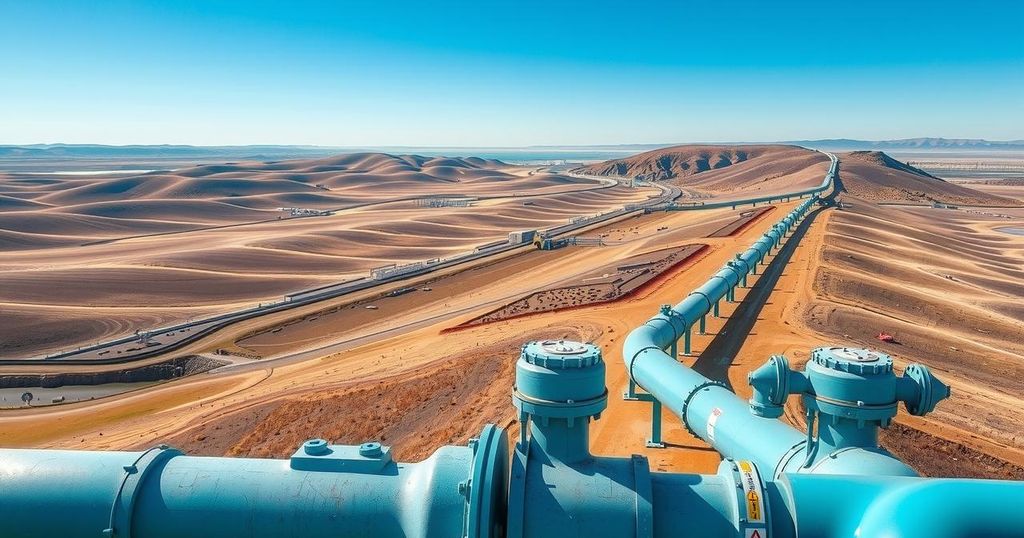Bolivia is facing public backlash over contracts signed with Chinese and Russian firms to exploit lithium reserves. The agreements, totaling $2 billion, have raised transparency and environmental concerns, leading to suspended parliamentary discussions. President Arce warns of severe delays in lithium production if contracts are not approved. Despite vast reserves, Bolivia’s lithium industry is underdeveloped due to political and structural challenges, necessitating urgent government engagement with local communities and stakeholders.
Bolivia is currently experiencing significant public dissent concerning its agreements with Chinese and Russian entities for the exploitation of its extensive lithium reserves. Community organizations argue that these contracts, signed in late 2022, provide minimal benefits to the local population, prompting the Bolivian Chamber of Deputies to suspend further parliamentary discussions as they seek to engage civil society in the matter.
The contracts, valued at approximately $2 billion, include a $970 million arrangement with Russian Uranium One Group and a $1 billion agreement with Chinese firms CBC and Citic Guoan Group. These partnerships aim to establish lithium processing facilities capable of producing substantial quantities annually. President Luis Arce has accused the opposition of purposely hindering these vital investments as a part of a political maneuver against his government.
If these contracts do not receive approval this year, President Arce warns of a potential decade-long delay in lithium production, suggesting that lithium will lose relevance in the market by 2035 or 2040 as alternative clean energy sources emerge. Omar Alarcón, the president of Yacimientos de Litio Bolivianos (YLB), expressed further concerns about a potential 15-year delay in establishing industrial-scale production if the agreements are not ratified.
Despite the advancement of negotiations, experts predict that large-scale lithium production in Bolivia will not start until 2031. Numerous civil society and environmental organizations, particularly from the Potosí region, expressed alarm over the transparency and viability of the deals, citing potential environmental impacts and economic drawbacks.
One critical issue is the noticeable cost disparity between the two contracts, with the Russian project reportedly having a production cost per tonne that is 2.4 times higher than that of its Chinese counterpart. Critics further question the feasibility of Uranium One Group’s rapid timeline of only 18 months to construct a plant before the contract’s expiration.
Under Bolivian laws, it is required for foreign investors to undertake thorough consultations with local communities and conduct environmental impact assessments prior to the commencement of such projects. With public consultations currently underway, government representatives have projected potential royalties of approximately $800 to $900 million for Potosi over 30 years.
Bolivia, despite possessing an estimated 23 million tonnes of lithium, has long struggled to develop a viable lithium industry due to various challenges, including political instability and problematic resource management. Recently, YLB initiated the operation of the first industrial-scale lithium plant in Bolivia, though it managed to operate at only 17% capacity last year, with a forecast of only reaching 23% in 2025. Government officials have assured the public that these contracts are flexible and will continue engaging various stakeholders to resolve emerging concerns whilst also emphasizing the importance of retaining 51% profit.
The ongoing controversies surrounding Bolivia’s lithium agreements with Chinese and Russian companies underscore significant public resistance, primarily due to perceived lack of transparency and potential environmental risks. With legislative discussions stalled, the Bolivian government faces an urgent need to address both local concerns and potential delays in lithium production that could profoundly impact the nation’s economic future. Engaging with stakeholders and ensuring compliance with legal requirements will be crucial as the nation seeks to develop its lithium resources responsibly and sustainably.
Original Source: www.mining.com




